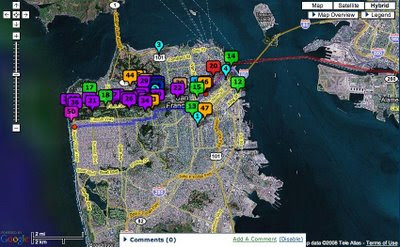
i began by asking them questions about their digital media use. how many of you read blogs? about 20 students raised their hands. how many write blogs? about 5 students raised their hands.
how many of you watch videos on youtube? all the students raised their hands! how many of you upload videos to youtube? 2, maybe 3 students raised their hands.
how many of you read wikipedia? about half of the students raised their hands. the other half looked nervously side to side, as if they were frightened to admit they read wikipedia in front of their peers, or, more likely, in front of their professors. "oh, come on!" i smiled, "you know you read wikipedia!" within a few seconds, nearly all of the students raised their hands. how many of you edit wikipedia? all hands dropped except 2 or 3.
when it comes to using digital media and making digital media, college students in krakow resemble college students in san francisco.

then i told them about the kinds of classes i teach, ending with digital media production and eating san francisco. i showed this classic photograph to highlight how my students are mobile media makers (or mmm!) who do not need television stations or printing presses or radio satellites or a whole lotta money to make, share, and distribute interesting stories. first important point: make media.

then i showed them recent USF graduate lulu mcallister's how to make a delicious omelet using wild foods. first, i explained the assignment: a) cook a delicious meal; b) document it. then i said that lulu's project wasn't made merely for a grade, or for her class, or for USF, or for SF - but rather for anyone and everyone. i highlighted how lulu's flickr set had been viewed by over one hundred people, including my wife, sarah, who through lulu's work learned how to make an omelete and a new way to cook mushrooms. second important point: share media.

then i went green.
i explained that USF has a new organic garden on campus, where students, professors, staff, librarians, administrators, jesuits, and community members come together to make and share food. i explained how professors melinda stone and seth wachtel's garden project students grow food, how professor hana mori's architecture students build benches and toolsheds and informational kiosks, how professor john callaway's environmental science students experiment with plant and soil diversity and sustainablity, and how my digital journalism students document the garden and gardeners via blogs, photography, and video.
"it's a green lab!" i said, or maybe yelled, "and we're making and sharing food and green media!"





so, i said, my students make media and share media. but things get most interesting, whether they are working on media or in gardens, when my students collaborate. fusing what my past students did in digital journalism and what my current students are doing in digital media production, i showed a map of san francisco, annotated by USF students. dragging my way around the map, zooming in and zooming out, i showed them USF campus, golden gate park, and the city of san francisco.

"i've got one last thing to show you all," i said as a way to signal my lecture's conclusion, "and it's a map of krakow!"
i raced to my laptop and brought up the annotated map of beautiful krakow that 15 papal university journalism students, professor krzysztof gurba, iwona sadecka from the US consulate in krakow, and i collectively created a few nights earlier. it was exciting to use the work of polish college students to teach other polish college students - students teaching students! returning to a point i made in the beginning of the lecture, i congratulated the students on our work and reminded them, and the rest of the students in the classroom, that we did not need a television station nor a printing press nor a radio station to make and share and distribute our stories about krakow. nor, i said, did we need lots of money. plus, i said, to the students in the room but really to all the polish students i met during my week-long trip, nobody tried to censor us.

polish students are less likely than US students to speak up in class and polish classrooms are less participatory than US classrooms, so i was excited that 5-6 students asked questions after my lecture. during Q and A, we discussed president obama and new media, the future of journalism, and the delights of polish food and beer. we talked about how traditional media broadcasts information and how digital media can create communities and conversations, a point i illustrated by noting the excellent fan community site, inxs.pl, co-created by a papal university journalism student joanna szumowska. then i took photographs (which, sadly, do not include all students in the room nor do they include the wonderful iwona sadecka from the US consulate in krakow and one of the organizers of the event).


after the lecture was over, krzysztof gudowski, a student who helped make the map of krakow and who joined us for post-map making periogis, approached me and said thanks.
"professor silver, i have decided something," he said. "i will make a flickr set of how to make delicious periogis."
"you know how to make delicious periogis?" i asked.
"yes. very delicious periogis," krzysztof answered. "i will make delicious periogis. i will document the process. then i will share it. therefore, you - in the future - will learn how to make delicious periogis."
"brilliant idea!" i said, and shook his hand. "and krzysztof," i said, addressing him but also hoping that my words would somehow reach all the college students in krakow and in poland, "thank you."

























